- Home
- Charles de Lint
Widdershins Page 3
Widdershins Read online
Page 3
His voice was soft and warm, husky with emotion. She wondered if her dream had now conjured up the ghostly spirit of the dead animal for whom she’d played her funereal air. It didn’t matter. This was far better than the horrible little bogan men, or the brusque Indian, even if he had rescued her and used his magic to fix her car.
This was like the time that she and Siobhan had gone camping with her grandfather. Pappy always went to bed late, but he was an early riser, too. “Don’t need the sleep like I used to,” he’d say, “and I never needed much then.” The two of them were up and sitting on a log by the lake where the campsite touched the water when they heard a rustle behind them. Turning slowly, they saw a doe and her fawn stepping out across the dew-laden grass.
She’d never seen eyes so warm and deep and brown. Something rose up from deep in her chest, and she’d gripped Pappy’s hand as they sat there for a good fifteen minutes, watching the two creatures feed. And long after they were gone, that feeling stayed inside her, the same deep warmth that she’d seen in the eyes of the deer. Years later, that memory could put her in a dreamy trance that helped wash away hurts or sorrows or simply the feeling that the world was all the same, one day blurring into the next.
This moment was like that, a great wash of awe that didn’t make her feel small, but rather, made her feel connected to everything.
“I . . . thought he needed some kind of a send-off,” she said.
The deer man nodded, antlers dipping.
“Her name was Anwatan—‘calm water’ in your tongue. She was my daughter and I give you the knowledge of her name as a gift for the music you played to send her spirit on its way.”
“Thank you,” she said, not quite sure what else to say. She’d always been bad at condolences. “I’m so sorry for your loss.”
His sigh of response held a world of sorrow and hurt.
“A father should not outlive his child,” he said.
“I can’t imagine what that must feel like.”
He dipped his antlers again. “I hope you never do. It . . . there’s an emptiness in me where she once was, and moment by moment it seems to only become larger.” His gaze found hers. “Sharing the gift of her true name with another helps only a little.”
That made Lizzie think of her rescuer.
You don’t need my name.
“Is there something special about names?” she asked.
She saw a quick flash of teeth—a smile, she realized, but it never reached his eyes. It was the smile that you saw at a funeral, when everyone’s trying to be normal, but you know it never will be. Or won’t for a very, very long time.
“Names are everything,” he said. “If you know the full, true name of a thing, it is at your mercy.”
“So it’s rude to ask someone their name.”
That got her another attempt at a smile. “It depends on who’s asking and why. If it’s someone who doesn’t know better . . .”
He shrugged.
“So that’s why he wouldn’t tell me his name,” she said.
She was speaking more to herself, but the deer man lifted his head, his nostrils working.
“I see,” he said. “There were others here—aganesha and a cousin of mine.”
“I guess I mean the cousin. Was he another deer man? He didn’t have antlers.”
The deer man shook his head. “He’d look strange with them, a bird with antlers.”
“A bird . . . ?”
“He’s corbae. My people are cerva. We’re cousins, but not close.”
“I don’t understand.”
“They’re just tribes,” he said. “His people usually sleep through the moon’s rise and set. Mine wander under her stillness because her light feeds our spirits, as food does our bodies. But we’re still cousins. If you need a speaking name for him, he’s been known to answer to Whiskey Grey—or just Grey.”
Lizzie smiled. “You make him sound like a bootlegger.”
“Well, I’ve heard that old jay does like his drink. He has his own sorrows, they say. Old ones. I don’t know the details.”
Neither spoke for a moment. Lizzie looked past the deer man for a moment to see the last part of the moon slip under the horizon.
“I’m dreaming, aren’t I?” she said.
“No. This is Kakagi-aki—your world. The dreamlands lie on the other side of the between.”
“It still feels like dreaming.”
The deer man nodded. “Perhaps it’s better if you see it that way.”
“That’s what Grey said. He told me to forget about all of this. To go on with my life like it had never happened. But how can I do that if it’s real?”
“I’m told forgetting can be easy, if it’s what you wish. But . . .”
When he didn’t finish, Lizzie prompted him. “But what?”
“You might not be allowed to forget. Or it might be better if you didn’t. Not if the aganesha have marked you. It would be better to be prepared, should they decide that you owe them for your intrusion into their business tonight.”
Lizzie looked nervously around them. “Do you mean the bogans? Is that what you call those little men?”
“A bogan is a kind of aganesha, yes.”
“So aganesha is your word for fairies.”
The deer man nodded. “It’s what we call all the beings that came with your ancestors to our world.”
“But you’re not aganesha yourselves?”
He made an angry sound that rose from deep in his chest and spat on the ground.
“We are the spirits of this land,” he said. “We don’t steal from others.”
Lizzie took a step back. “I’m sorry. I didn’t . . .”
“No,” the deer man said. “I should apologize. How could you know? Until tonight, it seems you knew nothing about any of us.”
“So these aganesha are trying to steal your lands from you? I guess the way Europeans did from the native people?”
“Not all of them. Most are content to keep to the territories spoiled by your people. But the green and the wild, these are still ours. Until you build upon it, the aganesha have no claim to the wild places.”
Lizzie gave a slow nod. “So your people stay in the forests and the aganesha stay in the cities.”
“We go where we please,” the deer man said. “We can live in your cities—it is still our land under the concrete and steel. But most of us don’t choose to.”
He looked to the sky, reading something in the position of the stars, Lizzie assumed from what he said next.
“I must go. I have still the sad tale of my daughter to tell my family, and the hour grows late.”
“I really am so sorry about what happened to her.”
“I know. I heard that in the lament you played for her. I saw it in the reverence with which you laid her flesh in the ground. I—my family—we are in your debt.”
Lizzie shook her head. “No, I just did what anybody would have done.”
“Then you don’t know many people. Most would have left what they found of her alongside the road like so much refuse.”
“But I don’t want anything from you.”
“I know that, too. But you could still have brought more trouble upon yourself from those aganesha. If they come after you, call for me and I will come. My speaking name is Walks-with-Dreams. My friends call me Walker and I hope you will, too.”
“I . . . do I really have to worry about those bogans?”
“Probably not. But it’s better to be careful. My daughter wasn’t.”
“Grey said to play music—that it would stop them.”
“It might give them pause. But you’d do better to call for me.”
“I travel a lot.”
“Distance doesn’t mean the same thing to my people as it does to yours. If you call for Walker, I will hear you, no matter where you are.”
“Okay. My name’s Lizzie—”
“Careful,” he said before she could finish. “The night has ears, and we
are too newly met for you to entrust me with your true name.”
“But among my people we use them all the time.”
He gave a slow nod. “And so squander the power of it. Unless the names you use are speaking names, and you simply don’t know your true names.”
“I wouldn’t know.”
The deer man nodded. “Neither would I. That’s a puzzle for the shaman to worry over, not common folk like you and me.” He lifted his hand. “Keep your strength, Lizzie. And thank you once more.”
And then he, too, like Grey and the bogans before him, was simply gone.
Lizzie stood for a long moment, listening to the quiet night around her. Finally, she turned and walked back to the car, her head brimming with all she’d been through since her car broke down. The first part had been scary, and handling the deer meat had been kind of gross, but talking with Walker, just being in his presence, had woken a song in her heart that she didn’t want to lose.
Maybe this wasn’t a dream. And if it was, she wasn’t sure she wanted to wake up from it.
Because for the first time in longer than she could remember, the world seemed to have weight to it. Everything seemed to have importance and meaning, and she felt connected to it in a way that never happened unless she was deep in a tune, lost in her music.
She made it back to Sweetwater without further incident and found the garage that Grey had recommended. There was an old and battered sign above the door to the work bay that read Tommy & Joe’s. The whole place seemed sort of run-down and nothing about it really instilled much confidence in her, but she decided to leave her car all the same. Grey had saved her life. And he’d gotten her back on the road. What reason would he have for steering her wrong now?
She wrote out a note describing the problem and where she was staying. Hesitating a moment, she turned off the ignition. The engine went quiet. She tried to start it again, just to see, but nothing happened. The car was as dead as it had been back at the crossroads.
She wrapped the key in her note and slipped it through the mail slot in the front door. Collecting her fiddle and knapsack from the car, she set off the few blocks down the road to the Custom House and hoped that Siobhan hadn’t taken in a guy for the night because, until Lizzie had decided to drive back to Newford, they were supposed to share a room. That’s about all these places would spring for: separate rooms for the boys and girls. Con and Andy would be sharing the other room, and she wasn’t about to go knocking on their door.
The front door of the hotel/bar was unlocked, but there was no one at the desk. Lizzie stepped behind the counter, took the extra key for the room from its hook and went up the stairs. Inside the room she was as quiet as she could be undressing and using the toilet, and then finally she was lying down in her bed. In the other twin bed, Siobhan slept soundly and moments later, Lizzie was, too.
Geordie Riddell
When I stepped out of the door by the loading bays, the parking lot was empty except for my brother’s old station wagon, still parked where I’d left it late last night. There was the start of a morning glow on the eastern horizon, and the cloudless sky above promised another beautiful day even though there were still patches of snow on the ground. But this was March in Newford. Some years we get more snow in this one month than we do through the whole winter. So far, we’d been lucky. The temperature was mild this morning and the promise of spring—officially here already, but yet to make an actual physical appearance—was in the air. Living in this part of the country, you took what you could get.
“Sure you won’t stay?” Galfreya asked.
I turned to look at her, shifting my fiddlecase from one hand to the other.
“Not tonight.”
“It’s morning now.”
I smiled. “So it is. But I should get Christy’s car back to him.”
If anybody else was here with us, they’d think I was crazy for turning down the invitation. Galfreya’s gorgeous. Sloe-eyed—as they say in the old trad ballads—and tall, her waist-length hair a messy storm of braids and loose curls decorated with multicoloured barrettes, feathers, ribbons, tiny bones, and other found objects.
This morning she was wearing her usual platform high-tops and a pair of black, hip-hugging cargos, but instead of one of her skimpy midriff-baring tops, she’d opted for a baggy sweatshirt, black like her cargos with the words NO FEAR stenciled on the front in bold yellow letters. She dressed like a skateboarder, no question, but the scruffy wardrobe only seemed to accentuate her fine-boned beauty, and it couldn’t hide the regality of the fairy queen she was.
Okay, so she was a seer and not a queen, but that didn’t change a thing except that I have to laugh as I use those words. All my life I’ve avoided the weirder side of life that my brother embraces, this idea that side by side with our world lies a secret, hidden world of fairies and goblins, ghosts, and other improbabilities. But the past two years have changed that. I’ve seen and experienced far too much that can’t be rationally explained away, culminating in my showing up here at the Woodforest Plaza Mall a couple of nights a week to provide music for a fairy court’s revels. I mean, once you’re part of a pickup band made up of little stick people and a troll playing a stand-up bass, it’s pretty much impossible to keep laying the “I don’t believe in this crap” card down on the table.
So now I’m a believer, but I’m not all evangelical about it like my brother Christy, or the Professor and Jilly, wanting everybody else to see what I see. I’ve just adjusted these long-held, if erroneous, beliefs and carry on with my life.
I wish I could say the same about some of the other personality quirks that seem to be hardwired into my psyche. Well, not my feelings about music. I don’t ever want to buy into the idea that recordings are anything more than a snapshot of a moment—especially not now, when they’ve got the software to tweak a bad performance so that every single element of a recording comes out sounding note perfect.
Music needs to live and breathe; it’s only pure when it’s performed live with nothing hidden—neither its virtuosity nor the inevitable mistakes that come when you try to push it into some new, as yet unexplored place. It’s improvisational jazz. It’s the jam, the session. The best music is played on street corners and pubs, in kitchens and on porches, in the backrooms of concert halls and in the corner of a field, behind the stage, at a music festival. It’s played for the joy and the sadness and the connection it makes between listeners and players.
When it’s played for money, it’s a job. When it’s played for itself, it’s magic. And I guess that sums up why I’ll always be living hand-to-mouth instead of making the decent living everybody thinks I should be making with it, because if a gig doesn’t seem honest to me, I’ll turn it down.
I’ve done the other kind. I’ve written for soundtracks. I’ve been a session musician on more recordings than I can count. I’ve played concerts. But I’m happiest sitting in a corner of the pub, playing tunes with a couple of friends, nothing planned, just seeing what happens as one tune reminds us of the next and then leads us into another.
I don’t think that’ll ever change. I wouldn’t want it to. But I sure wish I could figure out a way to stop putting women on a pedestal—or rather, stop obsessing about the unattainable women that I’ve put on a pedestal. I know it cuts me off from meaningful relationships I could have, and even if I do get into a relationship with one of these pedestal women, it never works out. Partly because no one can match up to an ideal anyway, and partly because what I’m bringing to the relationship is an unhealthy devotion. I get way more concerned about everything to do with them, which makes my own life just an echo of living instead of the real thing.
But knowing all of this doesn’t make me stop.
That said, Galfreya was a perfect candidate of someone for me to obsess over, but there were things about her that I just couldn’t get around. For one thing, being a fairy made her somewhat promiscuous—at least by human standards. I’m old-fashioned and expect a mono
gamous relationship. For another, she looks like she’s in her twenties, half my age, which feels strange enough. What feels stranger is knowing she’s . . . well, I don’t know exactly. Fairy-kind are basically immortal. For all I know, she could have been around since the beginning, when Raven first made the world. So it’s weird that it looks like I’m robbing the cradle, going out with someone who could be my own daughter, but she’s actually old enough to be some distant ancestor.
Then there’s the fact that I can only see her on her terms. I come to her at the mall, play my fiddle at her fairy revels, stay the night sometimes in her private quarters that aren’t quite in this world, aren’t quite in fairyland, but some place in between the two. She doesn’t come to a gig with me. To an art opening. To a movie unless it’s at the mall’s Cineplex. Out for dinner, except for ditto, and the mall eateries are never going to make it into the city’s best culinary guidebook any time soon.
So she’s not exactly an ideal life companion. She’s not someone I might expect to make a life with, to grow old with.
I know, how incurably romantic of me, looking for everlasting love in a world of five-second sound bytes, where most people find it more interesting to watch the so-called reality of other people’s lives in scripted television shows than to actually live one of their own.
But I do want that long-term stability. I don’t really expect to ever find it, but that doesn’t stop me from yearning for it all the same. That said, I also have to admit that I’m probably more scared of getting into a serious relationship than I am of living the rest of my life on my own. It’s not that I’m a commitment phobe. It’s just that whenever I do, sooner or later, I get left behind.
My last serious relationship really brought it all home to me—how this was something that was never going to work in my life. Because we were perfect for each other; what problems we had, we were both willing to talk about and work on, compromising where necessary—you know, all the things you’re supposed to do in a relationship, though that’s nothing I learned from my own parents. Tanya and I, we did everything right, but one day, there I was all the same, alone in our L.A. apartment, packing my bags to come back to Newford.

 Widdershins
Widdershins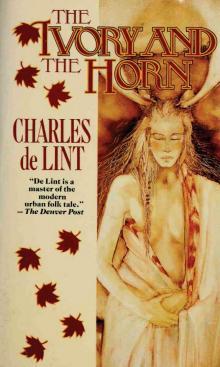 The Ivory and the Horn
The Ivory and the Horn Yarrow
Yarrow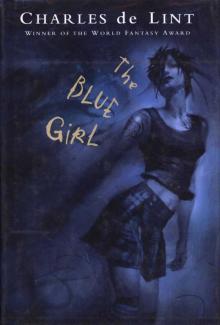 The Blue Girl
The Blue Girl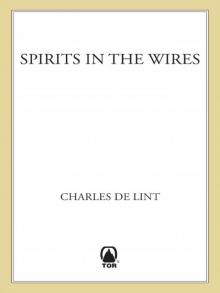 Spirits in the Wires
Spirits in the Wires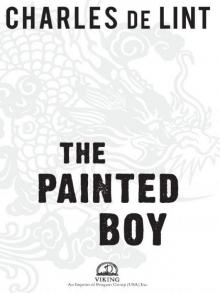 The Painted Boy
The Painted Boy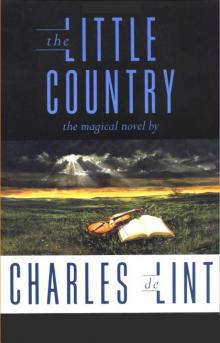 The Little Country
The Little Country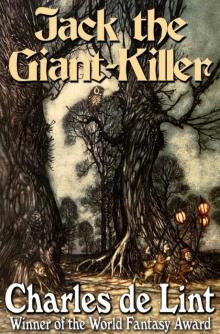 Jack of Kinrowan: Jack the Giant-Killer / Drink Down the Moon
Jack of Kinrowan: Jack the Giant-Killer / Drink Down the Moon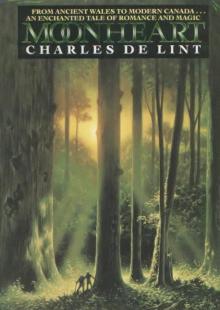 Moonheart
Moonheart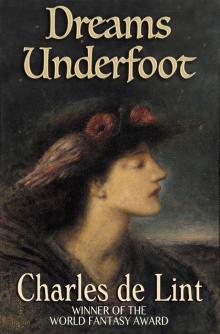 Dreams Underfoot
Dreams Underfoot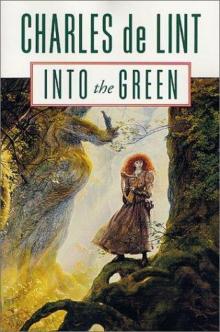 Into the Green
Into the Green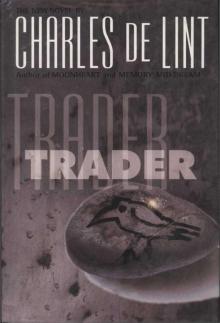 Trader
Trader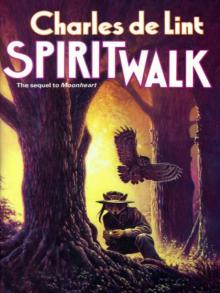 Spiritwalk
Spiritwalk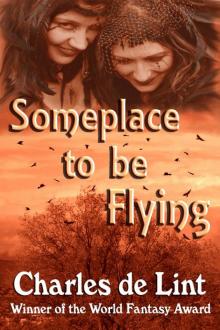 Someplace to Be Flying
Someplace to Be Flying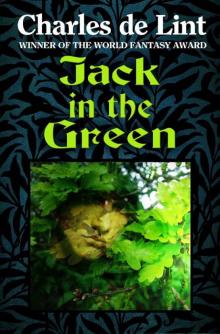 Jack in the Green
Jack in the Green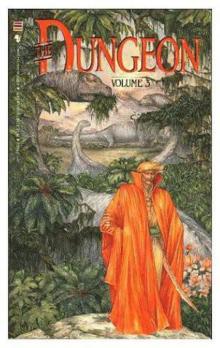 The Valley of Thunder
The Valley of Thunder Out of This World
Out of This World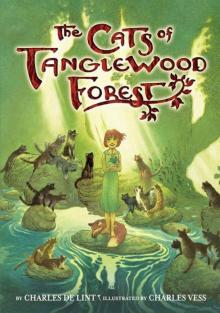 The Cats of Tanglewood Forest
The Cats of Tanglewood Forest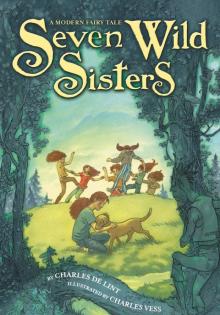 Seven Wild Sisters
Seven Wild Sisters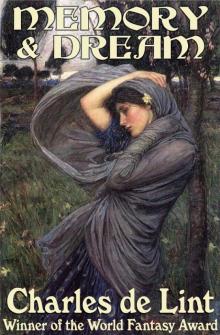 Memory and Dream
Memory and Dream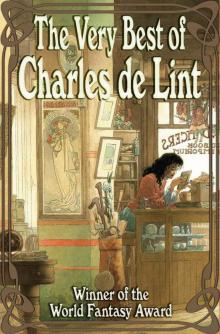 The Very Best of Charles De Lint
The Very Best of Charles De Lint Under My Skin
Under My Skin Forests of the Heart
Forests of the Heart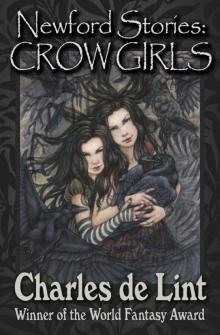 The Newford Stories
The Newford Stories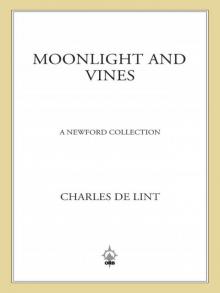 Moonlight and Vines
Moonlight and Vines Angel of Darkness
Angel of Darkness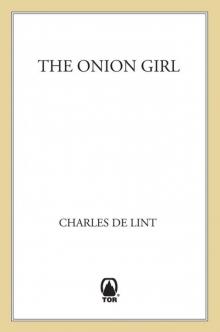 The Onion Girl
The Onion Girl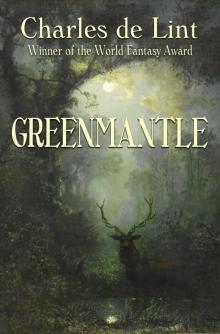 Greenmantle
Greenmantle Waifs And Strays
Waifs And Strays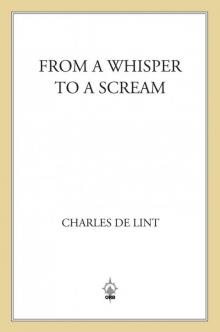 From a Whisper to a Scream
From a Whisper to a Scream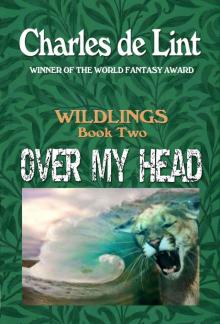 Over My Head
Over My Head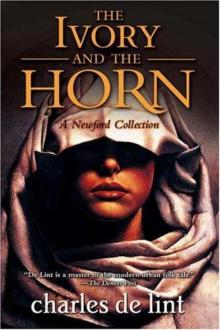 The Ivory and the Horn n-6
The Ivory and the Horn n-6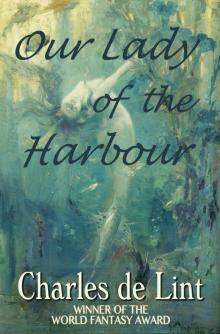 Our Lady of the Harbour
Our Lady of the Harbour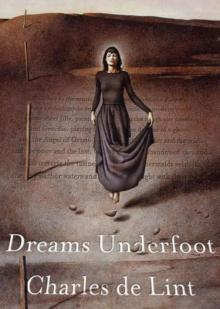 Dreams Underfoot n-1
Dreams Underfoot n-1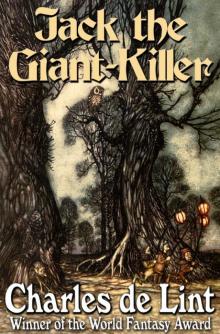 Jack the Giant-Killer (Jack of Kinrowan Book 1)
Jack the Giant-Killer (Jack of Kinrowan Book 1)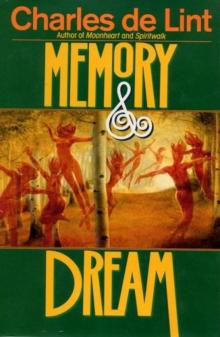 Memory and Dream n-5
Memory and Dream n-5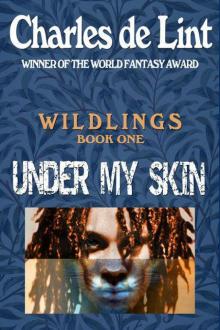 Under My Skin (Wildlings)
Under My Skin (Wildlings)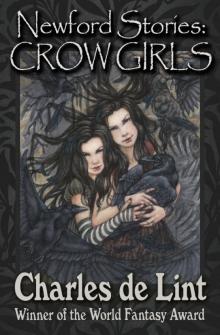 Newford Stories
Newford Stories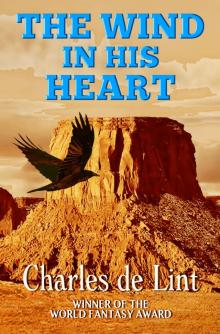 The Wind in His Heart
The Wind in His Heart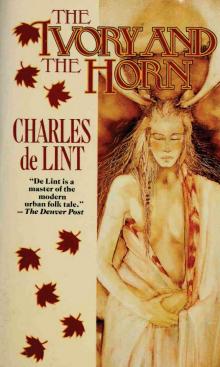 Ivory and the Horn
Ivory and the Horn